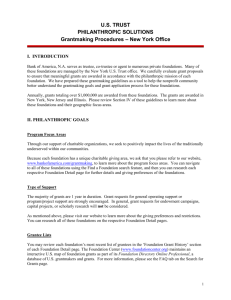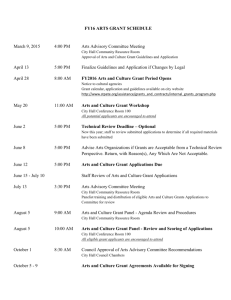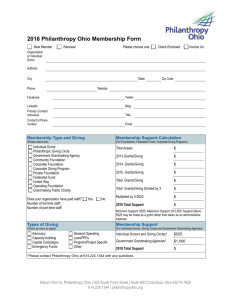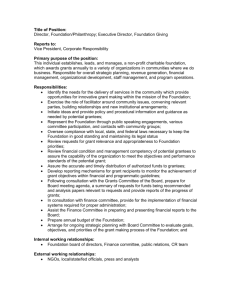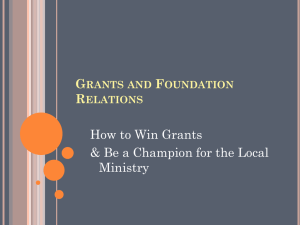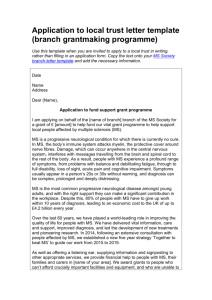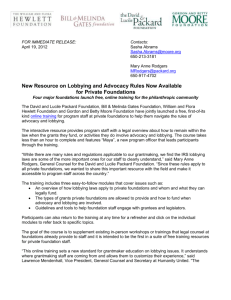Private Foundation Accountability Self-Assessment
advertisement
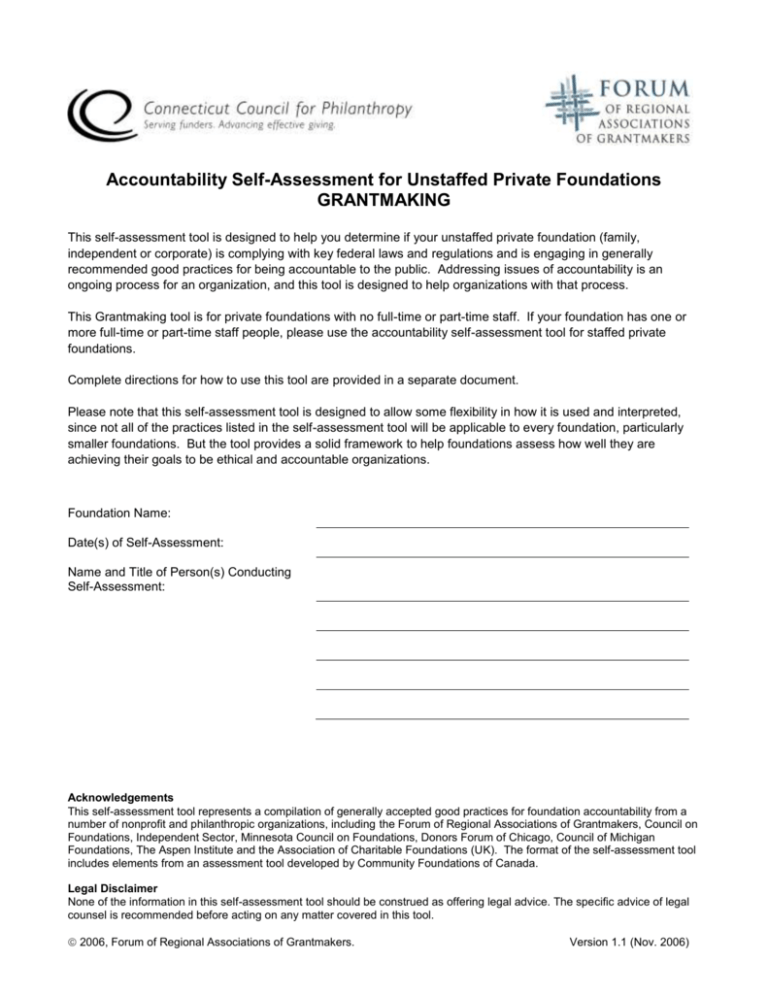
Accountability Self-Assessment for Unstaffed Private Foundations GRANTMAKING This self-assessment tool is designed to help you determine if your unstaffed private foundation (family, independent or corporate) is complying with key federal laws and regulations and is engaging in generally recommended good practices for being accountable to the public. Addressing issues of accountability is an ongoing process for an organization, and this tool is designed to help organizations with that process. This Grantmaking tool is for private foundations with no full-time or part-time staff. If your foundation has one or more full-time or part-time staff people, please use the accountability self-assessment tool for staffed private foundations. Complete directions for how to use this tool are provided in a separate document. Please note that this self-assessment tool is designed to allow some flexibility in how it is used and interpreted, since not all of the practices listed in the self-assessment tool will be applicable to every foundation, particularly smaller foundations. But the tool provides a solid framework to help foundations assess how well they are achieving their goals to be ethical and accountable organizations. Foundation Name: Date(s) of Self-Assessment: Name and Title of Person(s) Conducting Self-Assessment: Acknowledgements This self-assessment tool represents a compilation of generally accepted good practices for foundation accountability from a number of nonprofit and philanthropic organizations, including the Forum of Regional Associations of Grantmakers, Council on Foundations, Independent Sector, Minnesota Council on Foundations, Donors Forum of Chicago, Council of Michigan Foundations, The Aspen Institute and the Association of Charitable Foundations (UK). The format of the self-assessment tool includes elements from an assessment tool developed by Community Foundations of Canada. Legal Disclaimer None of the information in this self-assessment tool should be construed as offering legal advice. The specific advice of legal counsel is recommended before acting on any matter covered in this tool. 2006, Forum of Regional Associations of Grantmakers. Version 1.1 (Nov. 2006) Grantmaking This section focuses on a foundation’s management of the entire process for awarding grants, from handling grant applications (for those foundations that accept unsolicited grant proposals) through making final grant decisions. Level 1 – Legal Compliance Yes Grantmaking Process No NA 1. We engage in proper due diligence to ensure that all grants we make are used to further our foundation’s exempt purposes. 2. For any grants we make to organizations that are not charities (including social welfare organizations, trade associations, for-profit corporations), we take the appropriate legal steps to exercise expenditure responsibility. 3. For any grants we make to other private foundations, we take the appropriate legal steps to exercise expenditure responsibility and we take steps to ensure that the grantee expends the grant funds within 12 months after the close of the taxable year in which it received the funds (to comply with the "out of corpus" rule). 4. For any grants we make directly to charities outside the U.S., we take the appropriate legal steps to either exercise appropriate expenditure responsibility or to conclude that the grantee is the equivalent of a U.S. public charity. 5. We take the appropriate legal steps to ensure that our grants do not fund any organizations that will use the money for terrorism. 6. We ensure that any grants we make to a fiscal sponsor are not earmarked and that the fiscal sponsor has total control over how the funds are granted. 7. For any grants we make to individuals, we take the following steps: Ensure the grant would be used for a charitable purpose. Exercise appropriate due diligence. Follow IRS recordkeeping requirements for grants to individuals. Do not make any grants to disqualified persons. Make the grant using a procedure approved in advance by the IRS (for any grants for study or travel purposes, such as scholarships, fellowships or research grants). 8. If we make any grants to Type III supporting organizations that are not functionally integrated, we exercise appropriate expenditure responsibility for these grants. 9. If we make grants to any type of supporting organization where a disqualified person of our foundation controls the supporting organization or one of its supported organizations, we exercise appropriate expenditure responsibility for these grants. Acknowledgements This self-assessment tool represents a compilation of generally accepted good practices for foundation accountability from a number of nonprofit and philanthropic organizations, including the Forum of Regional Associations of Grantmakers, Council on Foundations, Independent Sector, Minnesota Council on Foundations, Donors Forum of Chicago, Council of Michigan Foundations, The Aspen Institute and the Association of Charitable Foundations (UK). The format of the self-assessment tool includes elements from an assessment tool developed by Community Foundations of Canada. Legal Disclaimer None of the information in this self-assessment tool should be construed as offering legal advice. The specific advice of legal counsel is recommended before acting on any matter covered in this tool. 2006, Forum of Regional Associations of Grantmakers. Version 1.1 (Nov. 2006) Grantmaking Level 2 – Good Practices for Accountability Grant Decision-Making & Management True Mostly True Sometimes True Never True NA True Mostly True Sometimes True Never True NA 1. We have a grantmaking policy and guidelines that clearly define the main areas where we will make grants and the areas we exclude. 2. We perform proper due diligence to ensure potential grant recipients’ fiscal and organizational viability. 3. We require and review reporting from grantees that is sufficient to enable us to confirm that a grant has been properly received and spent. 4. We have considered accepting a common reporting form (if one has been developed in our region). 5. We use discretion in both seeking and responding to requests for information about applicants or grantees. Grant Application If we accept unsolicited grant proposals: 1. We have taken steps to ensure that our grant application instructions are clear and consistent. 2. If we use a grant application form, we have designed the form to be as clear, concise and easy-to-use as possible. 3. If we use a grant application form, we have considered accepting a common grant application form (if one has been developed in our region). 4. We have developed and consistently apply a set of criteria for judging the eligibility and quality of all grant applications. 5. When a grantmaking policy or procedure changes significantly, we advise those affected by the change, including grant applicants, within a reasonable period of time. 6. We send a timely denial letter to applicants that are unsuccessful. Connecticut Council for Philanthropy ▪ Forum of Regional Associations of Grantmakers 3 Grantmaking Level 3 – Practices of Excellence for Accountability Grant Decision-Making & Management True Mostly True Sometimes True Never True NA True Mostly True Sometimes True Never True NA 1. We have defined and documented the roles and responsibilities of board members and advisers in the grant decision-making process, and ensure that this is understood by all relevant parties. 2. If we delegate grantmaking authority to a subcommittee or other group, we have clearly documented the terms of the delegation. 3. In developing policies and procedures to monitor grants, we have taken into consideration the costs in time and other resources required of us and the grant recipient relative to the size or purpose of the grant. 4. We use grant agreement letters to clearly explain payment procedures, reporting requirements, how we will monitor the grant, and mutual expectations. If we make site visits: 5. We have written policies and procedures for conducting and documenting the visits and using the information gathered from the visits. 6. We give adequate notice of the visits to grant applicants or grantees. Grant Application If we accept unsolicited grant proposals: 1. We make all grants within our guidelines. Any exceptions are reviewed by the entire board and do not exceed a maximum dollar cap or percentage of total giving. 2. If we routinely contact others for pertinent information about an applicant’s programs or proposal as a part of the review process, our guidelines say so. 3. We have developed and follow a procedure for responding to and acting promptly on all complaints from grant applicants or grantees. Connecticut Council for Philanthropy ▪ Forum of Regional Associations of Grantmakers 4

